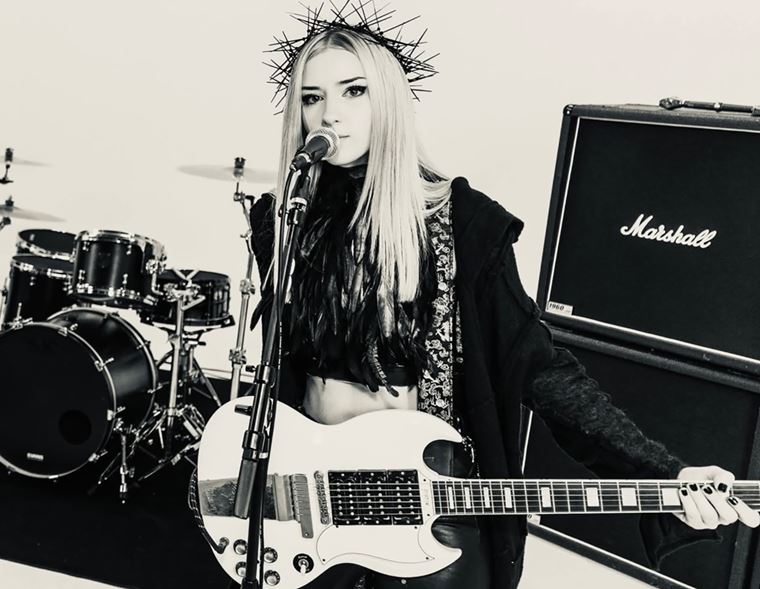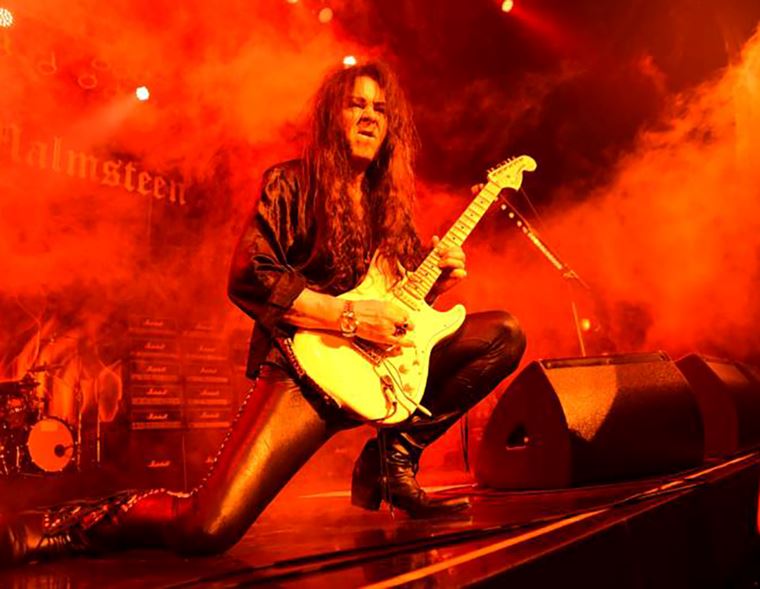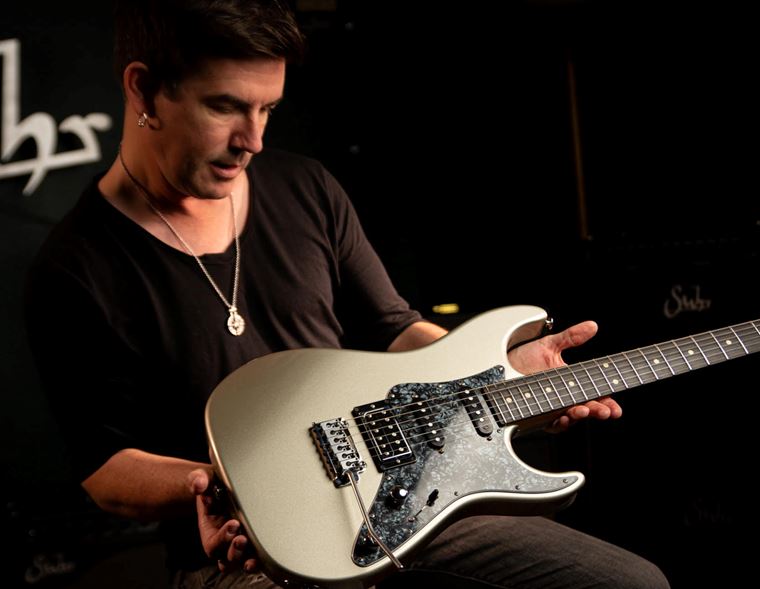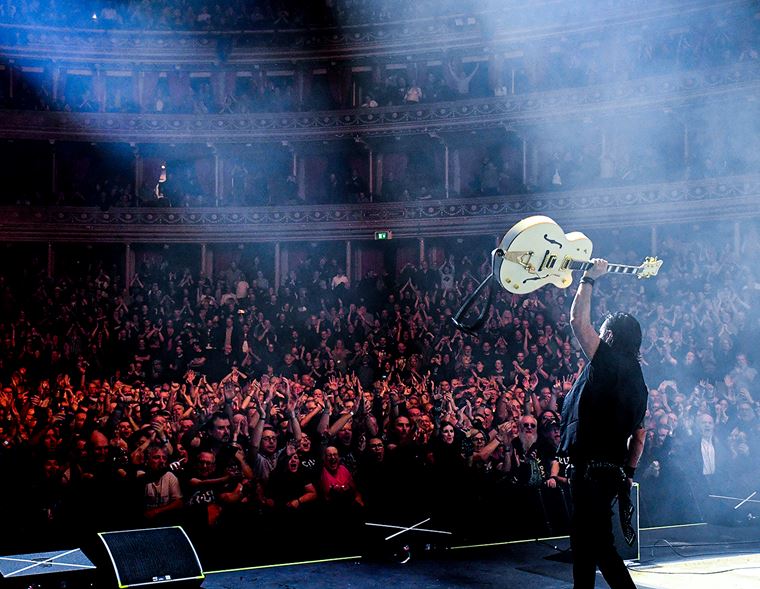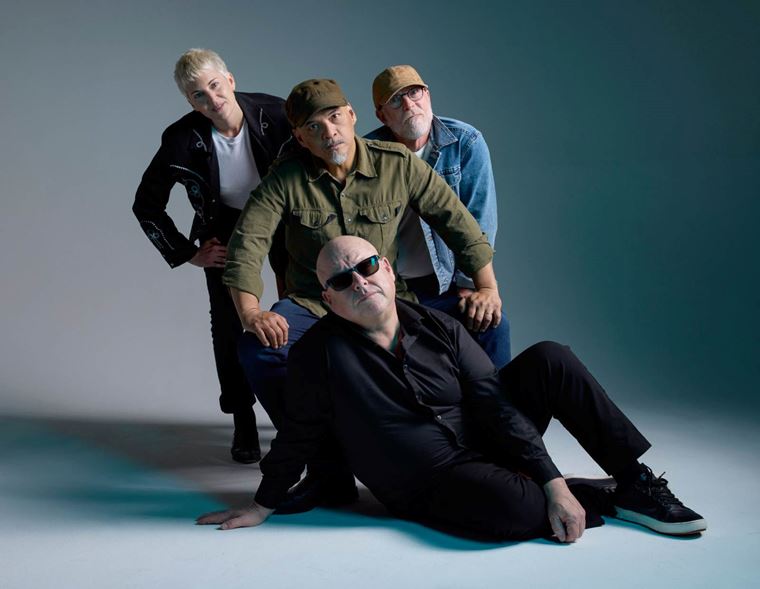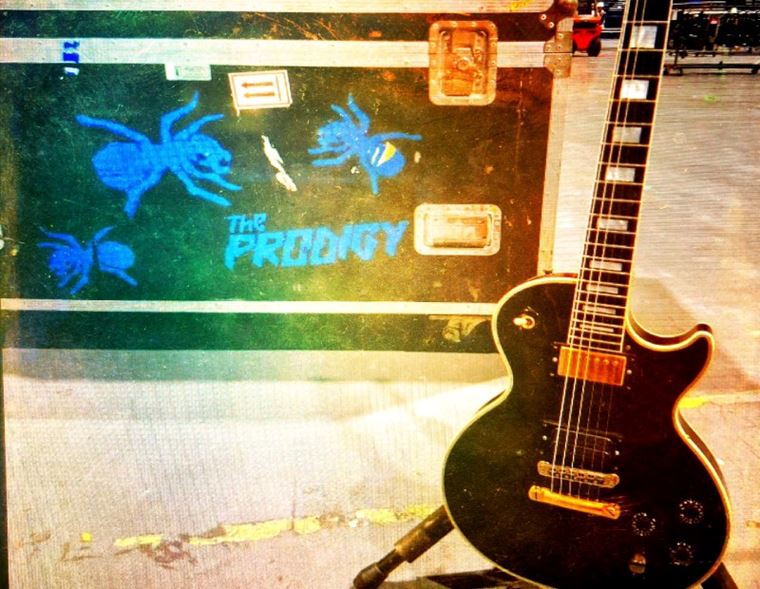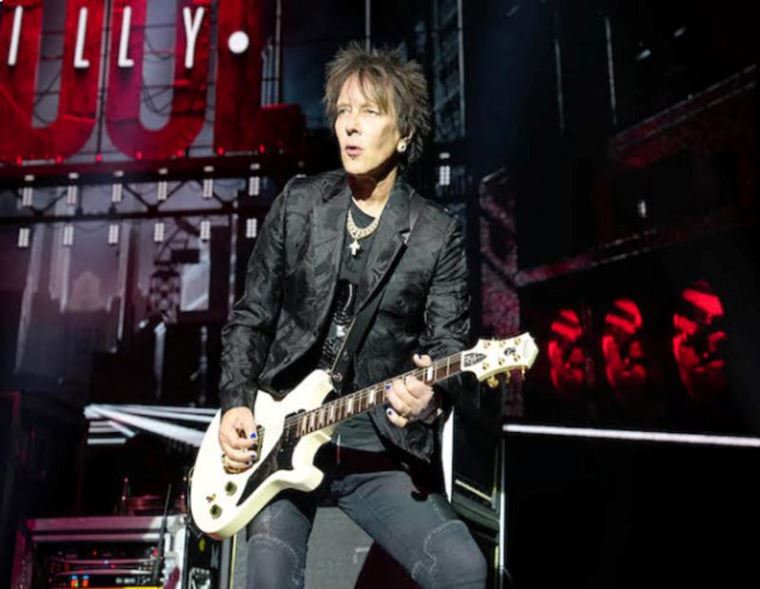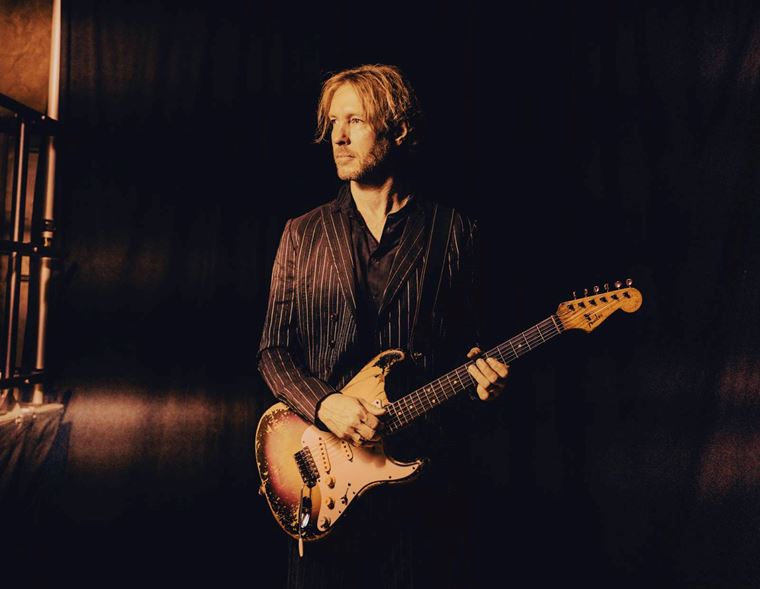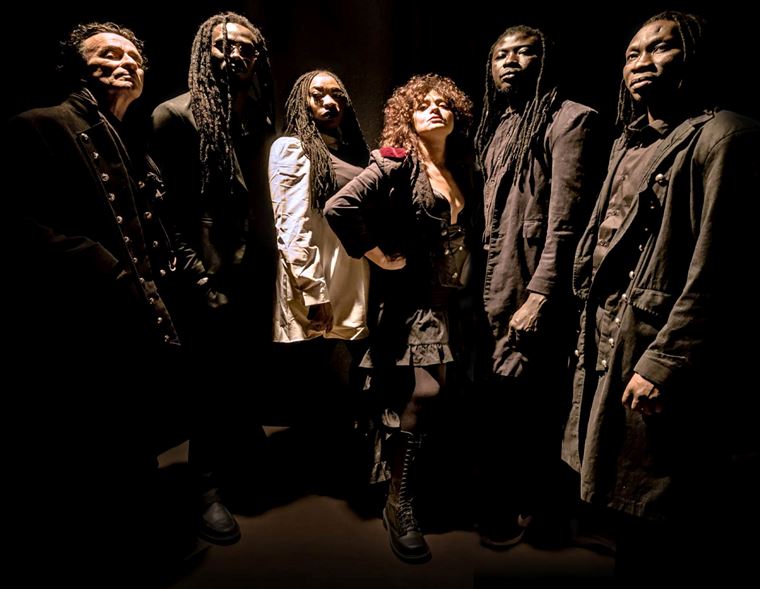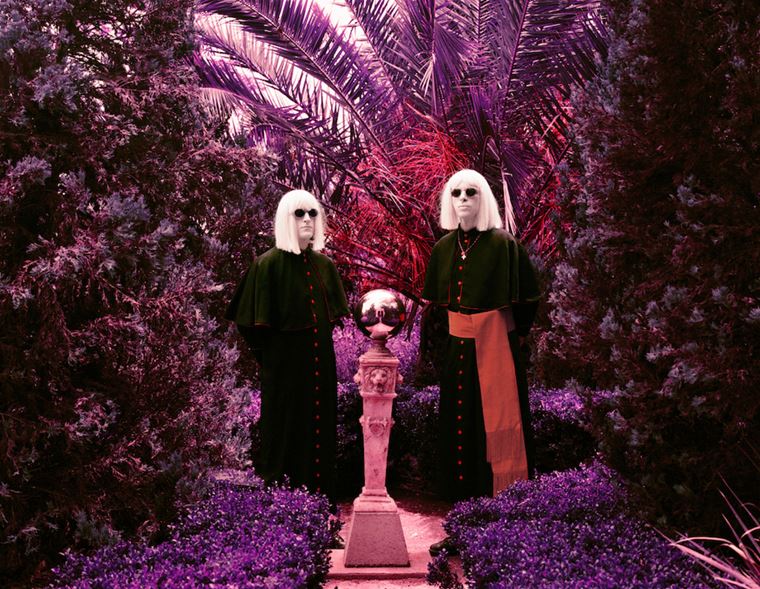Michael Jackson's Guitarist JENNIFER BATTEN on Jeff Beck and Cirque Du Soleil
Published on 17 November 2023
She played lead guitar for Michael Jackson for ten years. She toured and co-wrote with Jeff Beck. She’s done shows with the Cirque du Soleil and put out mind-bending solo albums.

(Photo: Jennifer Batten)
Her name is Jennifer Batten of course, and nobody has had a career like that!
Jennifer is a jaw-dropping player, a forward thinking composer (check out Momentum and Above, Below & Beyond for tunes that are as wild as they are inventive) and a travelling nomad who has played with the biggest stars on the largest stages in the world.
My list of questions was about three pages long.
I initially reached out to Jennifer when I heard she was going to be in the UK, but our schedules clashed and so we ultimately chatted on Zoom once she was home. As you’ll read, she doesn't stay home for long, and so I was very glad to be able to catch her for a career-spanning conversation that took in all of the above subjects, plus her thoughts on gear, playing, practice, stepping up, carving a unique path and having a unique sound.
It’s all here, and Jennifer proved to be excellent company: friendly, happy to share stories and quick to laugh. No subject was dodged, and we went deep with things like rehearsing with Jeff Beck and just what the reality is for a Cirque du Soleil musician. It’s all fascinating stuff, but what did you expect? This is Jennifer Batten!
Check out the entire transcribed piece or jump to a section by clicking the links below.
Contents
Guitar Synth - A Brave New World, Still
Whammy Bars, Tone Chasing, and Guitars That Look Disturbing
Playing Tips From Jennifer Batten
Jennifer Batten Interview
Guitarguitar: I just noticed earlier today that you’re going to be on the front cover of Premiere Guitar! That’s quite exciting!
Jennifer Batten: Yeah! It’s been a long time since I was on the cover of a guitar magazine, so it’s kinda cool hooking up with the new generation of women guitar players.
GG: I’m looking forward to reading that. But you’ve been busy all over the place recently with various types of live work, haven’t you?
JB: This season has been absolutely bonkers. I mean, I flew to Bogota for one show, was home for one day and then flew to the UK. My body clock is all kinds of fucked up! (laughs)
GG: Are you out on the West coast?
JB: Yeah. Portland, Oregon. I got home Monday for a couple of weeks and then I’m off to Uruguay and Argentina.
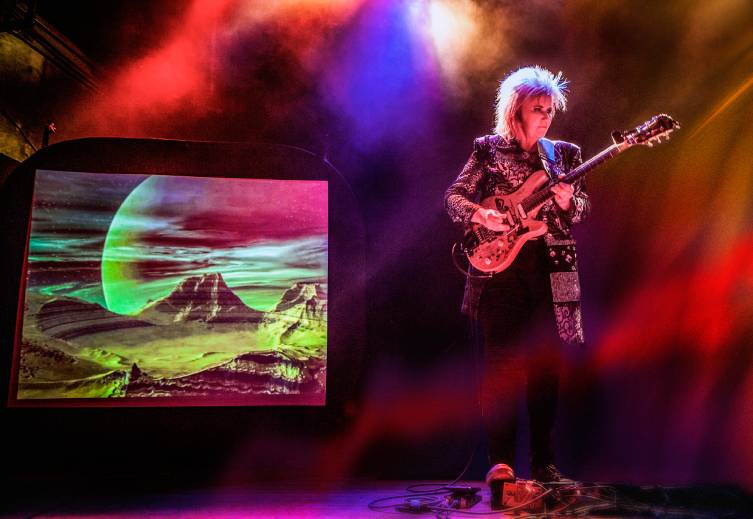
(Photo: Caroline Lauder)
GG: Wow! And is that to be doing your multimedia shows?
JB: Yeha, I’m looking forward to that, because a lot of the work I’ve been doing is Michael Jackson tributes and conventions and stuff. It’s a lot more work for me (laughs) but it’s more satisfying to be doing my solo show. I feel motivated to add some new material.
GG: Cool, what kind of stuff?
JB: So, when I do the multimedia show, I create films and the backing track is embedded in it, so I play the melodies and solos on top of that. I’m not adding new original music, but any time I take on a tune, I make it as original as I can, and it takes a hell of a lot of work but it keeps me excited.
GG: I say that video when you did about 21 of your favourite riffs all in one single song, that’s wicked!
JB: Haha, oh my god. I did that because I was on a guitar nerd tour with Uli Jon Roth and Andy Timmons. The whole audience is gonna be 99% male and guitar players, so I got the idea to do that, and I don’t think I’d pull that back up again, because that’s a lot to remember! (laughs)
Michael Jackson
GG: Haha, for sure! So, I’m interested in your own music and guitar playing, but just prior to that - if it’s cool - to talk about some of your famous collaborations and the tours you’ve been a part of. You’re very famous for being Michael Jackson’s guitarists for over ten years. What a rare experience! Most of us have no concept of what that would even be like. Are the memories still as vivid for you now as from back when they happened?
JB: Well, that’s an interesting question because my memories do get a little crusty (laughs), you know? And of course there’s stand-out memories that I’ll always remember, but the tours blend together. The Bad tour was the big stand-out, because it was before the allegations and he was on top of the world. It was my first time seeing the world, but the other two tours just kind of blend together and I don’t even remember some of the performers that were on there, which is sad! (laughs)
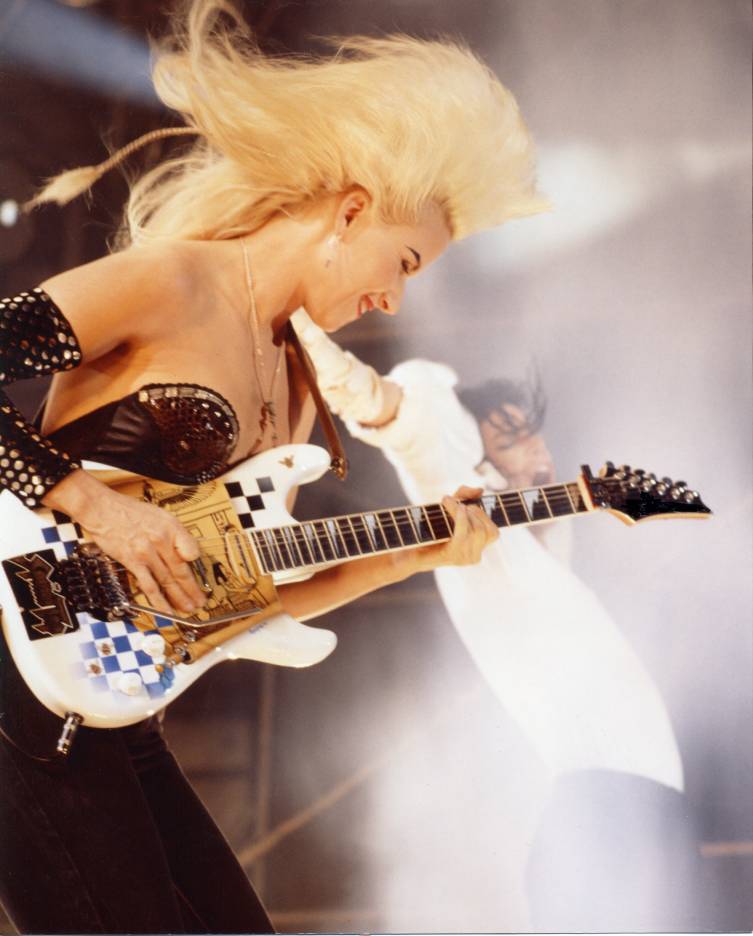
(Photo: Sam Emerson)
GG: I wonder what your take on this is: recently I was speaking to Pete Thorn and he mentioned that when he was guitarist for Chris Cornell, he said: ‘I wish I could tell people who get a good gig to be more mindful of it all’, because often he’ll see a YouTube video of himself performing with Chris and he can’t even remember that show because he had his head down, getting on with the job. Is that kind of how it was like for you, sometimes?
JB: Uh, as far as remembering where I was, for sure! People will ask, ‘did you ever do the north of Spain?’ and I’ll go ‘no’ and they’ll say ‘It was Barcelona and it was 1996’! I’ve got these archivists that’ll prove me wrong!
And by the way, Pete was a student of mine! At the Musician's Institute.
GG: Oh, brilliant!
JB: Yeah, just back when he was a little puppy.
GG: Oh, that’s fantastic! Now, I want to mention Jeff Beck and the Cirque du Soleil, but with the Michael Jackson tours, I’m presuming there was a level of choreography involved? Is it as much about hitting the right mark to avoid pyro as it is about playing the correct notes?
JB: Yeah, with Michael, absolutely. It’s interesting you should ask that, because I’m listening to an audiobook by the choreographer that did the Bad tour and Smooth Criminal - Vince Petterson - it’s called Icons and Instincts. It’s just fascinating, I didn't realise all that he had done! I mean, he worked with Madonna and Shirley Maclaine and all these wonderful people.
Yeah, it was a fascinating thing to be a part of, because I was just a guitar nerd who wanted to play and stare at my feet. He really brought me out of my shell and turned me into a beast! It’s funny: the staging that he did for Workin’ Day and Night, I got to improv a solo. When I first started - actually this was Michael’s guidance - I would always be smiling. When I was doing the Beat It solo, I was having a good time! And Michael stopped me and said ‘You know, the song is not…it does not require smiling. It’s about people beating the shit out of each other! (laughs) So that’s when I learned to grimace. And it’s funny, people see that film all these years later and they’re scared of me! Or, of who they perceive me to be based on this image that was created for me.
I’m really thankful for that, and thankful that Michael had a vision of what I could look like, because I was just a nerd with glasses, playing on an archtop! A lot of times, especially in the 80s, I would see ads in the local LA paper, people looking to put bands together, and looks were number one! So you had to have the look coming in. ‘Must have hair’ a lot of ads said!
GG: Haha! Must have hair!
JB: Yeah! Music was secondary, and I didn’t have a clue. Michael hired an artist to make paintings of all the performers on stage with three different costumes. Then, the makeup artist set out to make the painting come to life, then they took measurements and the wardrobe came to life. You know, most bands don’t have that luxury: you either come in ready to go, or they don’t choose you.
GG: Yeah yeah, the truth of it all can be rough. And you mentioned hair: that was one of your most iconic looks back then, that tall blonde hair!
JB: Yeah, that was all Michael: he wanted me to stand out! There are many photos and stills that I see where Michael’s in the spotlight and then you see my hair and that’s it. Haha!
Jeff Beck
GG: From even the back row, yeah! It’s awesome. So another of your really exciting collaborations was with Jeff Beck. That must’ve been intimidating - even though you’re an incredible player yourself - because he’s from that generation that you would’ve looked up to. I guess my question is: how do you approach such a situation? Particularly when you did some co-writing, right?
JB: When I first got the call that he was interested, I just peed my pants, are you kidding me? (laughs) You know? Because he was my number one guitar hero since I was 13 or 14 years old. Blow by Blow was on the radio, he’d just exploded with a whole new thing. To have him interested was not a dream I ever had, because he always played with keyboard players. I had all of his band members on such a pedestal and didn’t even see myself in the same realm.
So yeah, it was intimidating, and it was actually five years before we toured. So, I had all that time for anxiety to build up and I would see him on different tours and he’d always say ‘We’re gonna do this thing together’. I figured it’s just because I was in his face: I know what it’s like to be inspired and then see a squirrel and move onto something else (laughs) but sure enough, he called five years later and said, ‘I got a tour of Italy. Come on!’ I thought, man, are you bonkers? You’ve never even played with me before! By that time, I had two CDs out, and he’d heard those and had confidence in me from the CDs. Still, working with somebody live, you don’t know their personality or their work ethic or anything, and he just had faith.
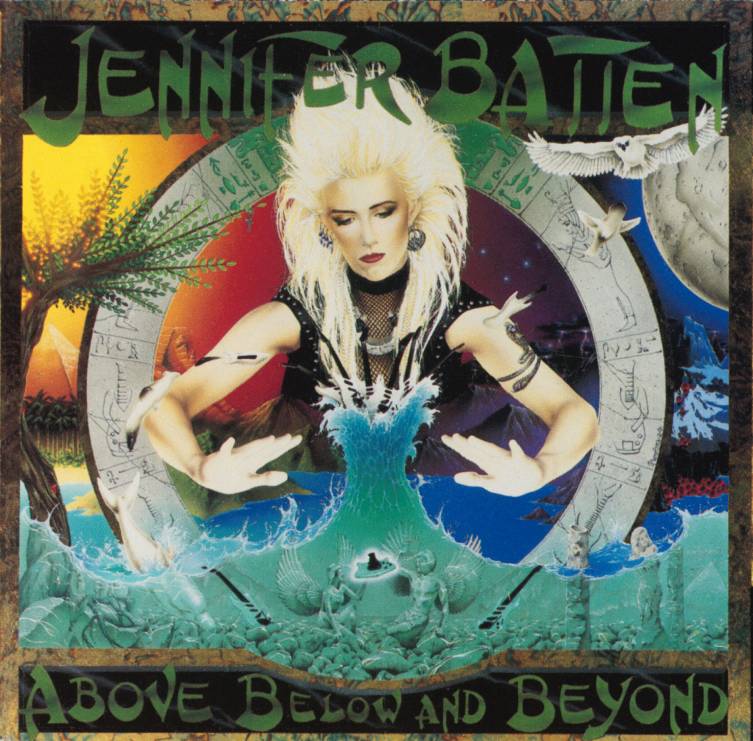
(Photo: Jennifer Batten)
So, I had a gig I was doing in Milan, a session I flew in for, and I booked myself to London and took a train down to his house. I learned most of the Guitar Shop record and played it in his presence, just to give myself an audition that he wouldn’t give me (laughs), you know? And just to make sure that we could spend some time together and that things are cool.
Now, here’s a memory that could be a little foggy: his wife brought out the whisky and I had a flight to Milan the next day and it wasn’t good! (laughs) I mean, it sure was fun and there’s no way in hell I would turn that down: I mean, Jesus, how many people get the chance to drink whisky with Jeff?
Now, here’s the real intimidating thing. I did have anxiety even after that, and he was still cool with having me play. I flew over for the first rehearsals and his manager was flying me down to his house, so we had at least an hour from London to go south to his place. He explained that, normally in Jeff’s band, the keyboard players were the musical directors and he goes: ‘Since you’re triggering keyboard sounds, you’re it’. (laughs) I go, ‘oh my god’, I don’t even know if I’ll last a day playing with him, never mind being the musical director! So it was a little rough at first, but I’ll say that it was due to his personality - like, I think some of the best musicians in the world are like 6 years old in their brains, and he was just like a kid who wanted to play in the sandbox and have fun. And that’s why he wasn’t the musical director, because he didn’t want to take that on! Basically that just meant that he would communicate with me, make changes that he’d want for the next day, and we’d rehearse the band then he’d come in a couple of hours later and do what he wanted.
You know, the intimidation went away pretty much just because of his personality, and because I spent every waking hour working on stuff and really doing the best I could do. (laughs) I mean, during rehearsals it would be one thing, then I’d be working till I fell asleep at night, then start over the next day.
"Jeff had an insatiable appetite for new material, new riffs: I gave him everything I had and thought, 'Yeah, I am so burnt out'"
So, it worked out! We did two records and two tours and honestly, at the end of it, Randy Hope Taylor the bass player and I were talking with Jeff about the future. Randy was the first to say it: he felt like he didn’t have much more to offer. Jeff had an insatiable appetite for new material, new riffs, new this, new that. I had spent all of my waking hours working directly on the tour material. I was writing so I was always giving him riffs and tunes and I felt the same way: when the words came out of Randy’s mouth, I thought ‘Urgh, don’t tell Jeff that!’ But then I thought, ‘Yeah, I am so burnt out’. I gave it everything I had and there was not a whole lot more. I felt that, and it’s a common thing after a tour. You need months to recoup and repair, but that was the end of that. We stayed friends and I’d go and see him on almost every tour that he did after that.
GG: What an incredible story. He obviously understood that you are something exceptional yourself and he had the confidence, otherwise you wouldn’t have gotten anywhere near starting that, far less doing two records and two tours, right?
JB: Yeah, it was two parts. It was because of the records that he heard from me and plus he knew I was a big fan! It was a bucket list to meet him and get an autograph so that’s how we connected. I knew Terry Bozzio (famous session drummer - Ray) so I think Terry had mentioned me before, too. Between that and doing all the tours with Michael Jackson, his managers said that gave him confidence that I had, you know, stage skills, and I wouldn’t crap my pants, basically. (laughs) It worked out great and it was such a joy. Bus rides are generally a drag, but listening to music with him and listening to his opinions and ideas was gold. Amazing.
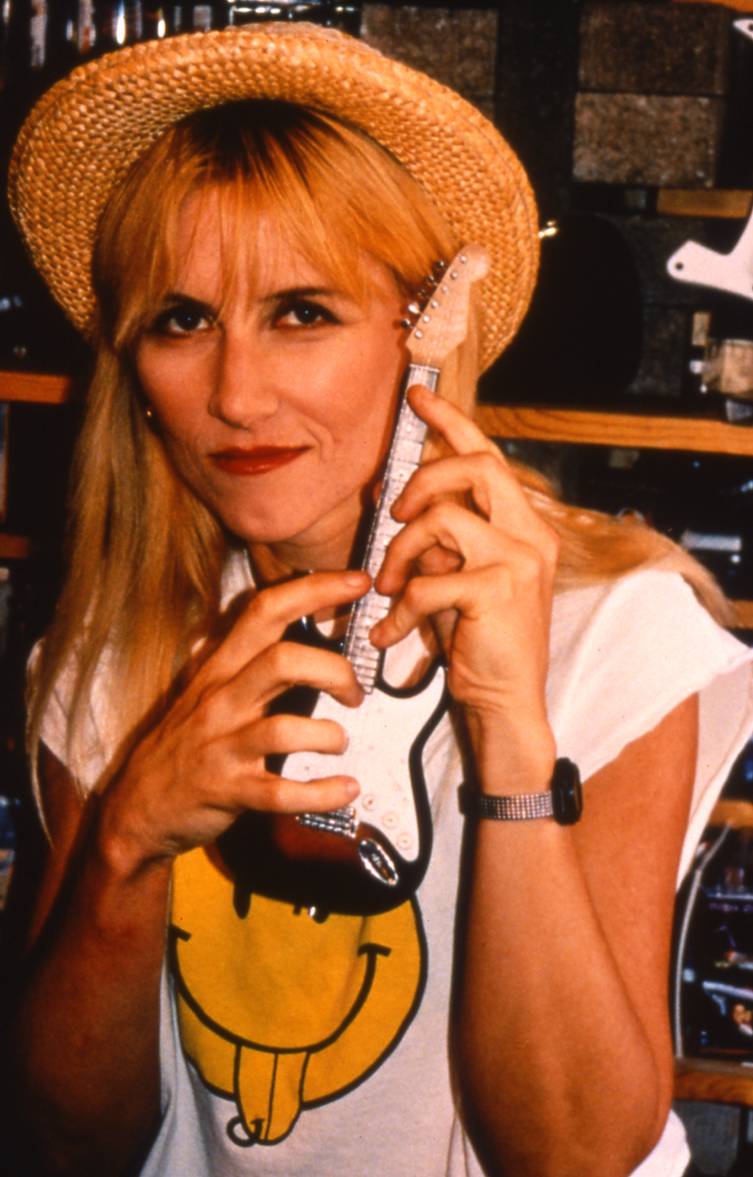
(Photo: Ann Marie Crouch)
Cirque du Soleil
GG: Wow, that’s such a special thing. And so it was some time after that you performed in Zumanity, the Cirque Du Soleil show? I’ve been lucky enough to speak to a couple of other guitar players who’ve worked with the Cirque (Nili Brosh and Robin Finck - Ray) and I just wondered how your experience was? Because it’s very much not about the band, even though the band are doing live music, right?
JB: Yeah, it’s interesting how my perspective really changed with them. I was a big fan of the Cirque: I’d seen a bunch of shows and I love ethnic music, and they are very experimental with their music. They’re really wild with their shows and all the wacky stuff that goes on. And I had thought…you know, there’s a saying in the US that Vegas is a place where musicians go to die (laughs) so I thought that maybe, when I retired from the road, maybe I would go to Vegas and play in whatever shows. I had never done it before, so there was a lot of anxiety there.
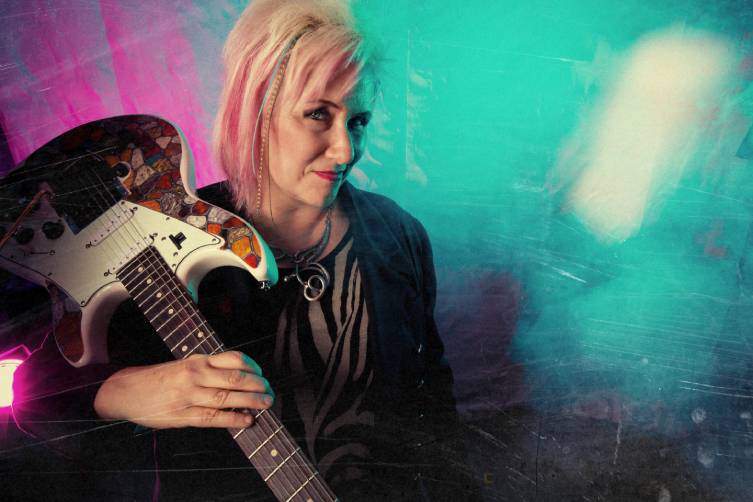
(Photo: Ali Hasbach)
So, I got the gig - I was subbing for somebody for six months - and at first I was really excited about it. But we did ten shows a week, nothing ever changed, it was the same music. The musicians were phenomenal, but like you said, it’s not about the music. I’ll never forget the first time…I was on this bridge with a violin player and the horn players. At one point, they wanted me to go down to the stage and I remember my first time down there, I’m looking around while I’m playing a solo and nobody knew I was there haha! There was like a striptease in the middle of the stage or something, and we’re all on in-ears, and I told them at one point I felt like I could be playing Highway to Hell and nobody would know the difference!
It just felt so isolated from any kind of emotional experience with the audience. So, it went from me feeling really thrilled to be a part of it for the first three months, and for the last three months, I couldn’t wait to get outta there because I felt like it was the most spirit-sucking, corporate hell you can imagine for a musician! (laughs)
GG: Wow! That’s crazy! What a take! For the audience it’s all so magical and you think that Jennifer Batten would be the perfect sort of character. But then, they don’t want YOU, they want a guitar player in the background, right?
JB: Yeah, and honestly, the only reason I think they had live musicians was because acrobats don’t always land on beat one.
GG: Ahhh!
JB: So, the musical director is watching the moves and he’ll add beats verbally in our ears to extend things from time to time, or shorten up things. If somebody has an accident, we have ‘emergency tunes’ that we’ll go into. Other than that, they’d use tracks if they could, I’m sure.
GG: Yeah. Wow, that’s such a cool insight. Behind the curtain for real, eh? Haha!
Guitar Playing and Composing
Now, let’s talk about your guitar playing and your music. What I always get from your playing is this sense of liveliness, and a unique, colourful voice of the guitar. I wondered, is that something you cultivated on purpose, this uniqueness that makes you stand out from other players? Or is that just how you happen to play?
JB: You know, I remember when I went to Musician’s Institute - which at that time was just a guitar school - I was listening to all these guitar players like Pat Metheny. I was like, ‘Man, he’s nailed that original sound. You know who he is in a couple of notes’. Jeff Beck, the same; and Robben Ford, Van Halen, all these people. One day, it just hit me: all the sounds are taken! (laughs) All the sounds have been taken. And I think I planted a seed in my own mind to try to carve out something different. Because of that, I was really attracted to wide intervallic skips, like Joe Diorio’s stuff. I memorised his intervallic book cover to cover, then when fellow classmate Steve Lynch started working on tapping…I mean, in 1979, that was super fresh! I hadn’t even heard Van Halen yet, so I really set out to work on that too, because here’s two really fresh things you don’t hear that often.
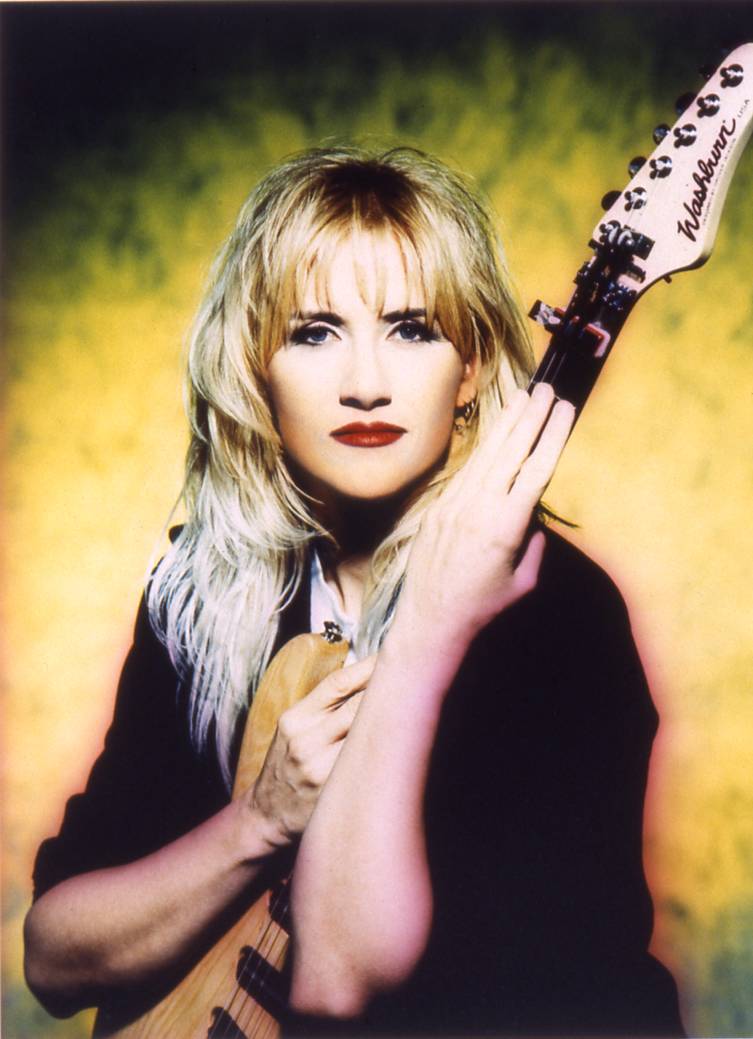
(Photo: Bilham)
And as any musician I think, things evolve over time and it’s a combination of what you’re striving for and what you’ve been listening to. In fact, I was talking to somebody the other day about how I probably learned 30 Charlie Parker solos. I was really into bebop at one point, and I’m barely aware of any of that in my playing now. But there was one Robben Ford solo on his song called North Carolina, it was just two choruses of the blues and two riffs in there that I use all the time. Those resonated with me so much more than any of the Charlie Parker stuff, so that’s the stuff that sticks.
GG: Yeah, and it comes out how it wants to come out, it's not life a conscious decision. Now, you mentioned tapping, and that’s a big part of your sound. I wanted to just pick your brain on tapping if that’s cool? I guess there are three things I’d like to know: what is your tapping finger?; where do you put your pick?, and; what do you do about muting the strings you don’t use?
JB: Well up until my latest guitar, I’ve been using a string dampener arm that I had manufactured in China. I’m running out of them! I have a couple of new guitars by Suhr and the strings are so high when they go over the bridge that I think it would really screw up the tuning if I were to put a dampener on there, so I’m kinda undecided as to what I’m gonna do. I bought some Gator mutes that I might be using. I don’t tap as much as I used to, honestly.
I use all four fingers of the right hand for tapping, so it’s not a ‘tapping finger’ I use. A lot of times, if I still have the pick in the hand, I’ll have it between the thumb and the first, and tap with the second finger. Sometimes I’ll do that and use the second and fourth finger if I’m gonna do a kinda pentatonic thing on the right hand. If I have a piece that’s worked out, or a long passage of tapping, it’s not the most sanitary but I’ll put the pick in my mouth! I’ll glide my thumb across the neck, it helps guide where my right hand is going.
So that’s how I do it and I tell ya, it took me thirty years to figure this out, but I would always get sick when I go on tour. I’d deprive myself of sleep the night before I fly so I could sleep on the plane, so that’s not healthy to start with. But I’m out shaking people’s hands, and then I’m putting that hand on the pick and then the pick goes in my mouth and duh! Of course I get sick from that! Now I’ve got a new regimen of washing my picks.
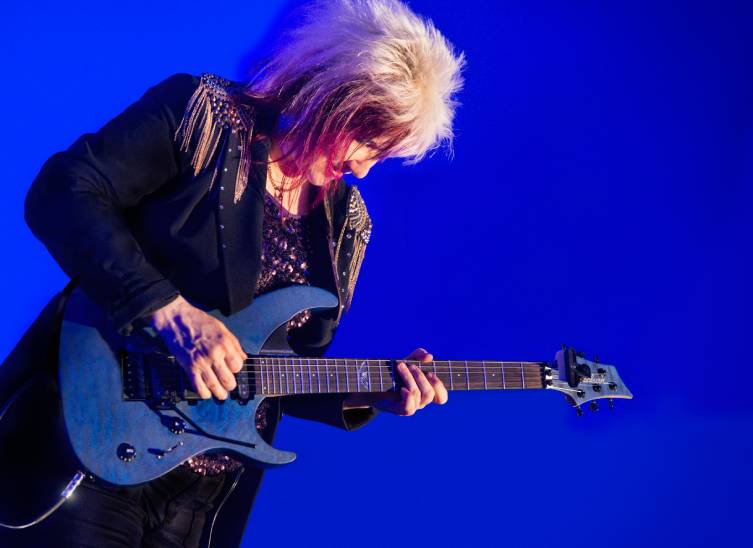
(Photo: Katarzyna Kusznerczuk)
Picks
GG: That’s a good shout! Out of interest, I was trying to find out what picks you use, and could not find any info. What picks are you using?
JB: For the last couple of years I've been using a company called Gravity that uses, I guess it’s plexiglass? Because of the material, it doesn’t matter how sweaty you are, you’re not gonna drop it and that's something I really dig about it. I find it hard to go back to other picks.
For the longest time I used little tiny teardrop Fender heavies and then I started having trouble with my knuckles. I went to the therapist and she said that when you have the smaller picks, they don’t go over the first knuckle: they’re underneath, and so you’re essentially sitting there carving away the cartilage year after year with millions of micromovements. I switched to a bigger pick that goes over the knuckle so I get that support, so the finger moves as a whole piece instead of…uh, destroying my career, haha!
Using a standard sized pick, I think, has slowed me down, but I’d rather be slowed down than having to stop.
GG: Absolutely! And do you have a preferred thickness with those bigger picks?
JB: 1.5mm is what I’ve settled on.
Guitar Synth - A Brave New World, Still
GG: Brilliant. I don’t know why I care so much about picks but I do! I think it’s important, so it’s good to know. Also, you are one of the fearless users of the guitar synth! I wonder if a lot of guitar players are afraid of the technology, or of going into that world? You’ve never been afraid of it. Is it the Fishman TriplePlay you’re at right now with all of that stuff?
JB: Yeah, this is a typical story for me. I went into a guitar shop for a strap and walked out with a synth! So that was a lot more than I thought I was gonna pay for. I just goofed around on it and put those sounds on my Momentum record, and I wouldn’t say I was an expert by any stretch, at that time, but when I got the gig with Jeff Beck, he was totally cool for me to just play guitar, and I thought: Man, that is never gonna work! We're covering songs from thirty years of Max Middleton, Jan Hammer and Tony Hymas: it’s just not gonna work. So, I forced myself to get into guitar synth, to try to cop those sounds for the live shows. That was a hell of a motivator: to be on a Jeff Beck tour! (laughs) I wouldn’t have put in that kinda effort if I hadn’t been under that amount of pressure.

(Photo: Brent Angelo)
I only wish the Fishman TriplePlay was available back then, because I ended up using Roland gear which was pretty slow triggering. The Fishman is a thousand times faster. But back in the Jeff days, I wouldn’t want to solo with any of those sounds because the lag time was just awful. But now, it’s been a number of years but I went across the country doing a Fishman TriplePlay tour. One of the demos that I did was Weather Report, Jaco’s Teen Town song, which is a fast bass melody. Bass has the most lag time of anything and I had this killer fretless sound, with no lag time that I could feel. If that didn’t sell it, nothing would.
They are very advanced, but I haven’t used them in a number of years. I’m sure there’s a lot more advancements since then.
GG: Mmm, I don’t know if there has been, Jennifer! I’ve been keeping an eye on it. I was gonna ask you if you have to change your playing to support that latency, or even just the note drop-out that you get with guitar synths, but it sounds like the Fishman is facilitating you to do whatever you like?
JB: Honestly, you have to learn each sound: how each sound behaves. If you’re gonna do an orchestral thing with strings, there’s always a delay. Even with keyboards, a direct contact, there’s gonna be a delay, so you just kinda have to feel out each one.
There was a Jan Hammer kinda Moog sound that I used to use that I didn’t have any trouble with: I could use a whammy bar with it, I could bend, I could do subtle movements with it and it would track perfectly. One of the hardest sounds is an acoustic piano.
GG: Yeah.
JB: That’s rough! And I remember having a communication with Robert Fripp at one point, because I saw him triggering acoustic piano sounds and it was flawless. I said, how the hell do you do that? Because I have glitches all over the place! And he said, ‘It’s the right hand’, so he must’ve had more of a beast of a right hand than me! I kinda gave up on that sound, but there are plenty of sounds that are inspiring that track great.
Whammy Bars, Tone Chasing, and Guitars That Look Disturbing
GG: Okay, cool. Maybe more players should investigate! You mentioned whammy bars there. That’s another big part of your expression and your technique. Do you have any particular preferences for things like: you know some bridges are recessed, some are more top-mounted…presumably you want some backbend from yours, right?
JB: You know what? I am going through the biggest change in decades right now. I was with Washburn for the better part of twenty years at least, and I’ve been using a Floyd since the early eighties, since I read about Van Halen using it. One of the tributes I play in from Brazil, the other guitar player in there had me play his Suhr Modern Antique guitar, 24 fret, through my system and I just lost my mind! It just sounded so much better! All of a sudden, I went from a Floyd to a Wilkinson and that’s a huge change! Where the bar is set drives me crazy so I’ve got a vice in my garage and I'm experimenting with different heights to be comfortable. And I also recently got a Vega-Trem, because I bought a Blug guitar from Thomas Blug, it’s kinda a replica of his 60s Strat, and I love the sound of it but the tremolo was driving me insane! It was making me really timid, because although it stayed in tune pretty well, I always felt like it wouldn’t. I just wasn’t using it enough and put the Vega-Trem in. So, I couldn’t tell you what I like because the jury’s still out! (laughs)
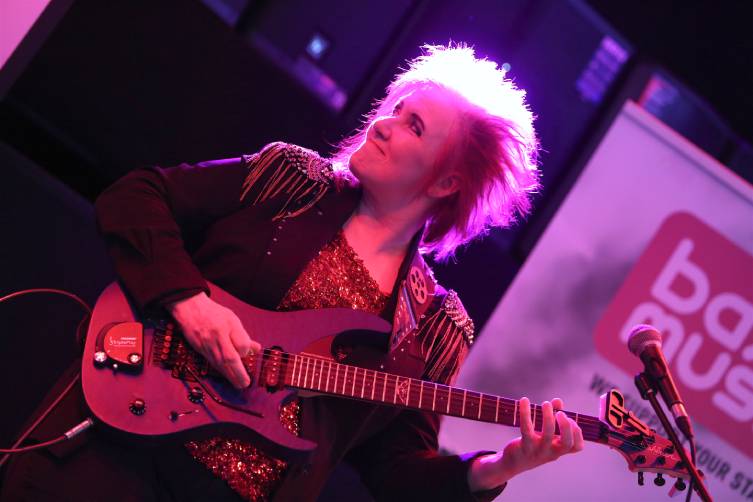
(Photo: Hans Colijn)
GG: Everything is revolving: nothing is static! So, have you moved on from Washburn? Is Suhr your go-to at the moment?
JB: You know what? I called up Washburn and they're not even making that guitar anymore, they’re 99% acoustic plus the Nuno model. I decided that I don’t wanna be stuck with any company right now because I’m really in an experimental mode. If Suhr blew my mind that much, I just played in the UK and the other guitar player in the band was using one of those Paul Reed Smith guitars that looks like a Strat with a headstock that’s just flat wrong, haha!
GG: Ah, you’re talking about the Silver Sky!
JB: Yeah! I find the look of it so disturbing but it sounded really great. I got a friend who has one of those so I’ve asked if I could borrow it. But yeah, I’m experimenting to see, you know, tone chasing for the first time in a long time.
Powerful Female Trailblazer
GG: That’s excellent. I can definitely see a John Suhr Jennifer Batten signature model happening, that would be amazing! Now, there’s one thing I’d like to ask you since I have no perspective on this. You are such a trailblazer, particularly back in the 80s as a female guitarist in the boy’s game, a shreddy player, you know? You broke down a lot of walls and busted a lot of preconceptions. What’s it like today, compared with back then?
JB: Haha, it’s night and day different right now. I thought, in 1987 when I got the Jackson tour, Prince had already had Wendy and Lisa and I thought, ‘Ah, the revolution has already begun!’ And then there was fifteen years of just crickets. No change at all that I was aware of. I think it really took internet speeds getting up where everybody could surf and see videos, and I think it just spawned a whole new generation of women who said ‘Yeah! I wanna do that too!’
"Sometimes when you're burnt out, you just need to go to a movie, you know? Just get the hell away from the guitar!"
In fact, in that article with Nita Strauss, she was saying that it was a huge influence on her, seeing that a woman was playing on the biggest tour on earth. So, I think it gave a lot of women confidence to at least stick their toe in and see how it went. And now there’s women who could kick my ass! There’s not a month that goes by that somebody doesn’t turn me onto a 7 year old girl in Indonesia who can kick my ass! (laughs) Guitar playing has just gone through the roof with changes. You got bands like Polyphia that are just doing these bonkers techniques that sound like a video game because that’s what they were raised on! There’s just a whole new level of music.
GG: I think, personally, that you should be celebrated at the same level as people like Steve Vai and Joe Satriani, and I think it’s great that you’re on the cover of Premier Guitar. It’s appropriate.
JB: Thank you. I appreciate that.
GG: Not at all! So, before I round things up, I feel like it’s well worth asking this: do you have any cool playing tips, any easy ways to get out of a rut for players who are getting a little bored of their own playing?
Playing Tips From Jennifer Batten
JB: One thing is to set a guitar aside that has an odd tuning so that you’re forced to play by sound, because none of the scale patterns are gonna work. That’s just a fun thing to do. In fact, Sting was talking about that, just playing an instrument that’s not yours. That’s why he started playing saxophone in the Ghost in the Machine record, just because it was so foreign and really made him think. Or explore.
For me, tapping was the same kinda thing. It really opened up the fretboard amazingly. I tend to keep my left hand on automatic pilot, maybe in a pentatonic shape, and the right hand is what I pay attention to, so I got two things going on at the same time for one idea. You can come up with chord voicings that you could never do with one hand and it just sounds different: it’s a lot more legato than if you used a pick.
And sometimes when you’re burnt out, you just need to go to a movie! (laughs) you know? Just get the hell away from the guitar! I wouldn’t recommend staying away from it for very long: sometimes when I come off the road, I just don’t even want to see it for a week. Then it really makes you fresh, it’s almost like ‘How can I miss you when you won’t go away?’ (laughs)
GG: Yeah, exactly! Great advice! And yeah, we mentioned at the start that you’ve had a very busy time of it lately, so what’s happening next for you?
JB: My life for the last decade or so has been like Mission Impossible: I open up my laptop in the morning and it’s like, ‘Okay Jennifer, here’s your assignment. You’re gonna go to Argentina and do a workshop’. (laughs) There’s a couple of guys behind a tour called G-Fest, Guitar Fest, in South America. They originally contacted me a few months ago and said they wanted me to tour Chile. I go, ‘Ok, fine. It’s gonna be my own material and I’ll play with some locals’, which sounds like fun because I’ve been doing a whole lot of Jackson tributes. And now there’s nothing in Chile! I got enough offers in Uruguay and Argentina that that’s where I’m going! So that’s a couple of weeks. July and August these last couple of years I’ve set aside for my own local band doing 80s covers. I just adore the band, they’re really talented. I have been trying to travel less, then covid hit and I went ‘Ah Jesus, get me out of here’!
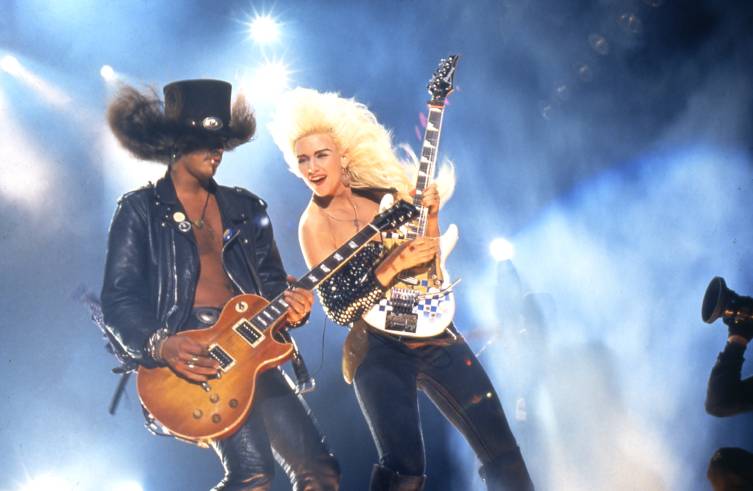
(Photo: Sam Emerson)
So it’s kinda funny: I want to travel less and all I’m doing is living on a plane these days! Most of my work is 5000 miles from home so I'm kinda riding with the wind right now. I haven’t been motivated to do my own music: I’ve done a hell of a lot of sessions in the last couple of years, and when I’m home, I really dig doing that. I love the variety of it, because I’ve been doing everything from really ambient, New Age stuff to hardocre metal stuff. Neither of them is what I would do for my own show, but I really love being dipped into that, because it really makes me creative and makes me do things I wouldn't ordinarily do.
But as far as my own music, it’s kinda like: the music industry is so jacked that I just can’t see putting another ten grand into doing my own album only for people to take it for free. There’s no other business model in the world that goes, ‘We’ll just put our money into this and spend a couple of years doing it knowing that we won’t make any money back’. It’s just bonkers to me. But as long as other people - and it’s usually younger people looking to make their mark - as long as they want me on their record, I’m cool with that.
What a great conversation to be part of! Wherever Jennifer currently is, you’ll be able to find her through the official Jennifer Batten website, where you can also see tour details, buy her albums and check out her tuition books. I’d like to thank Jennifer for not only finding the time to chat, but also for giving us such a wealth of knowledge and insight.
For more articles like this one, head over to the guitarguitar interviews page, where you’ll find over 150 exclusive interviews with the likes of Steve Vai, Joe Satriani, Sophie Lloyd and Guthrie Govan!


